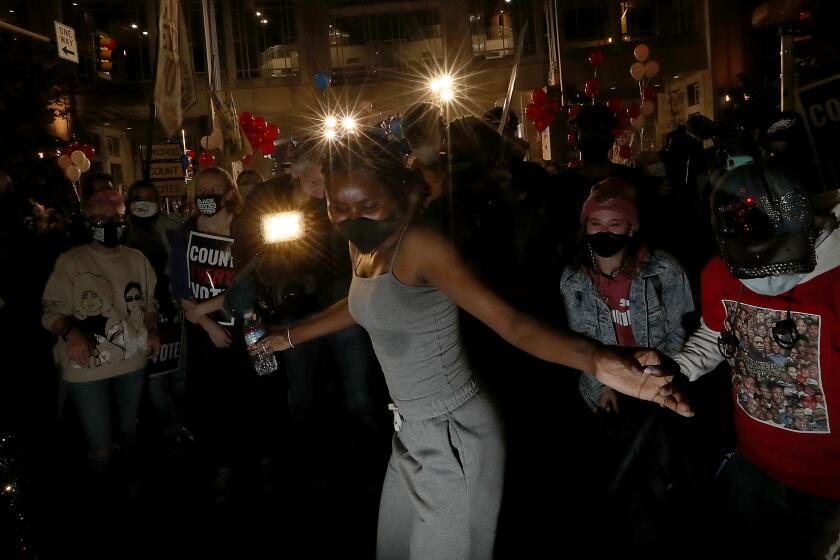After year of civil unrest, Measure J asks voters to approve criminal justice reforms

After months of civil unrest triggered by controversial police shootings, the momentum for criminal justice reforms has reached the ballot box, with voters in Los Angeles County for the first time being asked if more public funds should be diverted to social services instead of police and jails.
The voter question, called Measure J, would require that 10% of locally generated, unrestricted county money — estimated between $360 million and $900 million — be spent on a variety of social services, including housing, mental health treatment and jail diversion programs. The county would be prohibited from using the money on prisons, jails or law enforcement agencies.
The measure has pitted community justice activists against law enforcement officials and their backers over sharply differing visions of how the measure would affect policing. While it doesn’t call directly for police budget cuts, opponents claim that funds would inevitably be slashed from law enforcement, with L.A. County Sheriff Alex Villanueva, in a tweet, going so far as to raise the specter of a “Mad Max” future in the region if the measure passes.
The measure comes in response to a national reckoning on racism, as voters in several states will see proposals on their ballots promising police reform. Measure J appears to be one of the few options favoring increased social services funding over direct police reforms. It is the first time something like this has been tried in L.A. County, home to the largest jail system in the country, said Kelly Lytle Hernández, a UCLA professor who has extensively researched L.A.’s criminal justice system.
“This is watershed moment,” Hernández said.
Proponents say the measure’s aim is not to slash police staffing but instead address the significant costs of jailing low-income residents who commit low-level offenses as well as people with mental illnesses and substance abuse disorders.
Photos: Election day voting is over but the counting continues.
An estimated 61% of the mental health population in L.A. County’s jails — about 3,400 people — would be more appropriate candidates for less costly, more effective diversion programs, if those programs had space or existed, according to a report by RAND Corp. published earlier this year.
“We can’t take them out of the jail system because there’s nowhere to put them in the community,” said Eunisses Hernandez, co-chair of the Re-Imagine L.A. County campaign, which is leading the charge on supporting Measure J. “That where we are, where we have relied too much on the carceral system to deal with our most vulnerable folks.”
Opponents of the measure include the Assn. for Los Angeles Deputy Sheriffs, which has spent more than $3.5 million on campaign advertising on TV and social media aimed at convincing the public that Measure J’s goal is to essentially defund the police.
“Measure J could mean deep cuts to vital services like 911 emergency response, public health nurses and first responders,” the narrator says in one ad.
Supervisor Sheila Kuehl, one of four supervisors on the five-person board who back the measure, said there isn’t a “shred of truth” in the No on J campaign ads that claim essential workers will be harmed.
Kuehl said jobs based in punishment, such as the Sheriff’s Department detention officers in county jails, are becoming an outdated concept that has proved to be ineffective in curbing crime. “Punishment has not really worked well for society, and society is saying more, and louder, ‘We would like to try another way,’ and that’s what this reform is about,” Kuehl said.
It is unclear the exact amount of money Measure J will divert because much of the county’s unrestricted funds varies from year to year. Of the $9 billion in unrestricted money in the county’s $35-billion budget this year, about $2 billion goes to the Sheriff’s Department. Measure J funds would total about $360 million based on this year’s budget, according to an estimate provided by county officials.
Supporters insist that Measure J does not require money to be taken from the Sheriff’s Department — only that the 10% it carves from the budget couldn’t go to the agency. But in a board meeting in August, acting county Chief Executive Fesia Davenport said that the Sheriff’s Department would probably be more affected than other first responders if Measure J passed.
“The category of first responders that would be impacted and that would have the highest likelihood are staff in the Sheriff’s Department,” Davenport said.
Villanueva, a regular sparring partner of the board, was immediately against the measure, tweeting in late July when the board voted on it that if voters “don’t want your streets to look like a scene from Mad Max, use your VOICE to tell the board what you think,” referencing a 1979 film about a post-apocalyptic world highlighting the collapse of modern society.
“Measure J is profoundly dishonest because it doesn’t tell you that when you lose 10% of your budget, what happens to the department,” Villanueva said Sunday night during a Feel the Bern Democratic Club meeting, arguing that if Measure J passes, it could lead to the closure of sheriff’s stations and a decrease in homicide investigators and would harm marginalized communities that suffer disproportionate rates of violence.
Measure J made it to the ballot thanks to a confluence of factors: the massive upswing in support to address systemic racism after George Floyd’s killing, a spate of police shootings of local residents in recent weeks that heightened demands for more police oversight, and existing momentum from the L.A. County Board of Supervisors to address criminal justice reform, including a recent board measure that pushes to close the decrepit Men’s Central Jail.
Hernandez said advocates want to see the county use Measure J money to invest in a decentralized system of care that makes healthcare, jobs and housing programs accessible to residents in need, regardless of where they live in the largest county in America, making investments that address the root causes of crime through evidence-based programs rather than punishment.
Although opponents argue it would hurt county jobs, Measure J could actually increase the number and types of first responders in L.A. County, providing funding for unarmed emergency mobile teams who respond to 911 calls involving mental health crises, Hernandez said.
As the need for jails decreases, there would be a decline in “punishment” type jobs — but with Measure J’s investments in mental health and community programs, the county would see a substantial uptick in social service employment opportunities, Kuehl said.
If the county were to build another 4,000 mental health beds, or make similar moves to expand addiction treatment, there’d be a major need for those workers.
“The same with people who are building housing and helping find housing for people,” Kuehl said. “There will be quite an increase in services and helping jobs.”
Measure J’s opponents argue that it’s unnecessary to mandate spending on causes that the Board of Supervisors has already invested in. The Los Angeles County Professional Peace Officers Assn., a union representing some sheriff’s deputies, has said the measure “will cripple public safety” and “harm the communities it aims to help” by diverting nearly $500 million “away from essential county services.”
Supervisor Kathryn Barger, the only Republican on the board, has said she supports the needs of investing in community but fundamentally disagrees with “budgeting by ballot.”
“We all agree that we need to commit essential resources to support investment in our communities and alternatives to incarceration,” Barger said in a statement. “Instead of moving forward with this rushed measure, the Board of Supervisors should take this opportunity to discuss these issues at length with our stakeholders and community leaders.”
More to Read
Sign up for Essential California
The most important California stories and recommendations in your inbox every morning.
You may occasionally receive promotional content from the Los Angeles Times.












